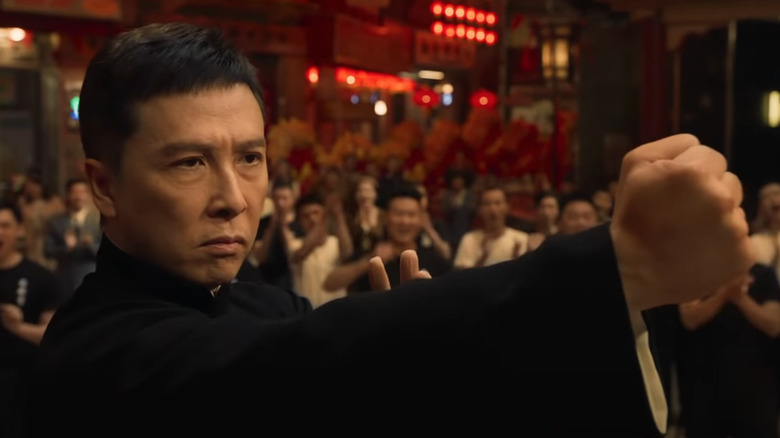
Throughout the "Ip Man" franchise's run, there's been an awkward question plaguing the popular film series. The Donnie Yen-led action movies have proven incredibly successful in their native Hong Kong and mainland China, also managing to gain fans internationally. Combined, the four movies have earned almost $422 million at the global box office, telling an exaggerated and often downright fabricated version of the life of the eponymous Wing Chun grandmaster.
Since "Ip Man" released in 2008, Yen, along with his director Wilson Yip and producer Raymond Wong (both of whom are Hong Kong natives), have returned time and time again to the story of the real-life Ip Man as inspiration for their fantastical retelling. As Yen said when promoting "Ip Man 3" in 2016, while his character is "based on a real person," he and the production team "didn't want to make a documentary," instead aiming to "create a new type of hero on film." That's amounted to a successful run of four movies that were, at best, loosely based on the real figure.
By the time "Ip Man 4: The Finale" came around in 2019, it was well-known that the films not only exaggerated the central character's life, but often tailored their narratives to suit the tastes of mainland China. At the time, the country was (and still is) exerting more influence over the devolved administrative region of Hong Kong than ever before. All of this made it more than a little awkward that the "Ip Man" saga comprised what /Film alum Hoai-Tran Bui once dubbed "nationalistic martial arts movies where China proves its superiority through bombastic showdowns."
Once the Hong Kong protests of 2019 got underway, "Ip Man 4" found itself at the center of controversy. And while on the face of it, the issue with the film appears fairly simple, it's actually a lot more complicated.
The Real Ip Man Vs The Movies
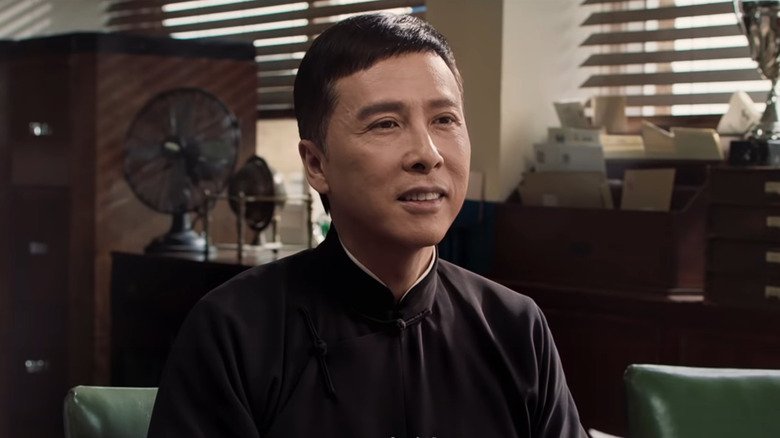
Ip Man was born in 1893 and grew up in Foshan, in Guangdong province, China. After learning Wing Chun, he went on to become a member of the Kuomintang political party, which opposed the Chinese Communist party. When the CCP won the Chinese Civil War and descended on Foshan in 1949, Ip Man escaped to Hong Kong, then under British control, where he became one of the first public practitioners of Wing Chun. He opened a martial arts school, becoming a mentor to students including Bruce Lee. He died in 1972, just seven months before his protégé Lee would also pass way.
When, in 2008, it came time bring this impressive life story to the screen, director Wilson Yip, producer Raymond Wong and writers Edmond Wong (son of Raymond) and Chan Tai-lee opted for a more grandiose retelling — as is immediately evident from the over-the-top fight scenes in the first "Ip Man" movie. The film finds the titular grandmaster in the midst of the Second Sino-Japanese War where he defends his countrymen against invading Japanese forces, even fighting a Japanese Army General (which almost certainly never happened). Right away, the "Ip Man" movie saga embodied nationalistic Chinese sentiments, playing on the country's history and Ip Man's own life to embolden patriotism in the motherland.
This continued throughout the series, with Ip Man taking on the British in "Ip Man 2." The third movie introduced Danny Chan as Bruce Lee and saw Yen's Ip Man take on none other than Iron Mike Tyson, who plays a western property developer with his eye on Ip Man's martial arts school. Whatever else the franchise tries to pass off as historically accurate, it's well-documented that the real Ip Man never came to blows with the former Heavyweight Champion of the World.
What Happens In Ip Man 4?
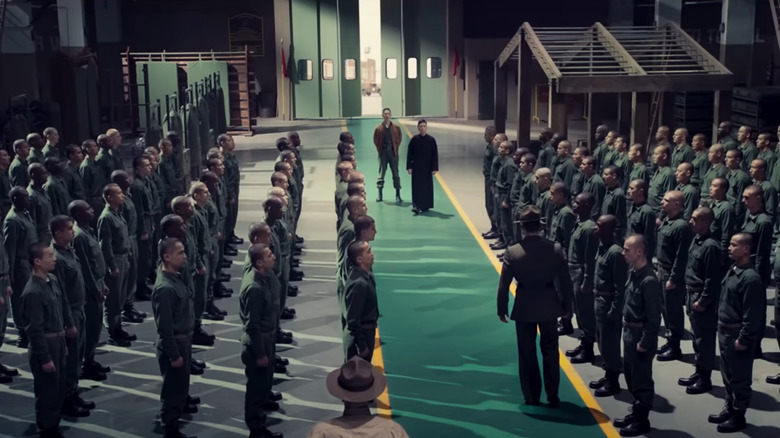
This brings us to "Ip Man 4: The Finale." Once again directed by Yip and produced by Wong, with Hiroshi Fukazawa on script-writing duties, the film sees Donnie Yen return in the title role alongside Chan as Bruce Lee. This time, they leave both China and Hong Kong behind for San Francisco, where Lee has opened his own Wing Chun school and Ip Man gets into it with who else but openly racist American Gunnery Sergeant Barton Geddes (Scott Adkins). Again, the film bases its narrative on real-life events (Lee did indeed run a martial arts school in the city) but deviates from reality fairly dramatically (the real Ip Man never set foot in the U.S.).
But, having dispatched the Japanese, British, and Mike Tyson, Ip Man was due a confrontation with the U.S. — perennial foe of modern-day China. And it proved a winning formula, with the fourth installment bringing in $192 million at the global box office and proving to be the most successful entry in the series yet. It also just so happened to drop the year before China outperformed the North American box office for the first time, bringing in $2.7 billion to North America's $2.3 billion in 2020. Unfortunately, both Ip Man and China's domination of their western adversaries was marred by the controversy that surrounded "Ip Man 4."
What's The Deal With Hong Kong And China?
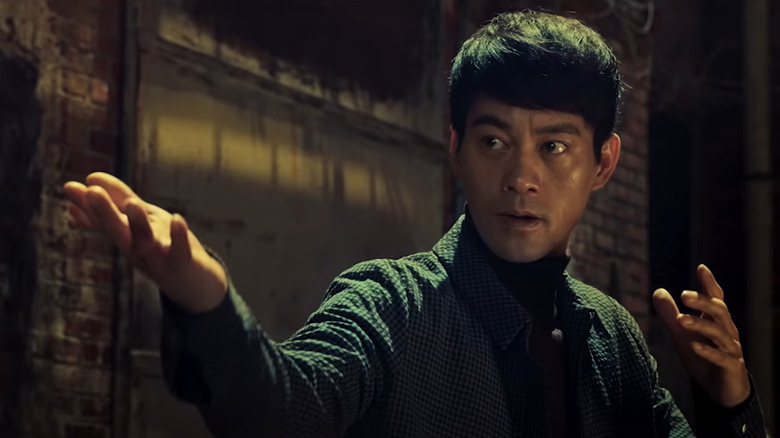
To really understand the "Ip Man 4" controversy, you have to know a little bit about the history of Hong Kong and its relationship to mainland China. In 1842, Hong Kong itself became a colony of the United Kingdom that was essentially ruled by the Queen, who had her appointees administrate the region. It was handed back to China in 1997, after which it became a "Special Administrative Region," maintaining a separate government and economy to the mainland. At the time, China agreed to abide by the "one country, two systems" rule, which would afford Hong Kong its political autonomy and allow for it to retain its capitalist system within the framework of China's communist system for fifty years. It even retained its own money and passports.
Since that handover, however, The People's Republic of China has tightened its grip on Hong Kong. While the region retains devolved powers in its executive, legislative, and judicial branches, many of those governmental wings are populated by Chinese loyalists. What's more, China's President Xi Jinping has moved to exert his influence in the former colony, using Beijing's authority to interpret Hong Kong's Basic Law. The Basic Law provides Hong Kongers with freedoms that mainland China does not enjoy, such as freedom of assembly and speech. Unfortunately, many contend that those freedoms are now under threat from Beijing.
The Protests
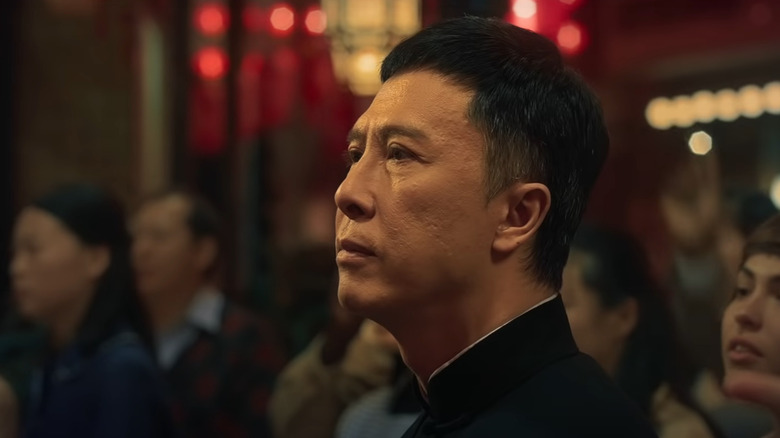
Things reached a fever pitch in 2019 when, in February of that year, Hong Kong's government (which contained many Chinese loyalists) proposed a new extradition bill that would allow for criminals in Hong Kong to be transferred to China to face trial. The "Fugitive Offenders and Mutual Legal Assistance in Criminal Matters Legislation" caused more than a million people to take to the streets in protest in June 2019. By the following October, the bill had been withdrawn.
Those protests, some of the largest Hong Kong had ever seen, soon came to symbolize fears surrounding China's ambitions to exert increasing control over Hong Kong. Protestors called for full democracy in the city-state — something which, despite the freedoms afforded to Hong Kong, had eluded the region throughout its history. The pro-democracy movement would, however, take a hit in 2020 when China introduced a Hong Kong Security Law with wide-ranging powers that would make it easier to prosecute protestors and reduce Hong Kong's autonomy. Among many provisions in the bill, it criminalized acts of secession and forbid collusion with foreign forces. The UK's Foreign Secretary at the time, Liz Truss, remarked that the new law represented "a systematic erosion of liberty and democracy in Hong Kong."
Things haven't got much better since then, with China continuing to erode Hong Kong's autonomy with changes to its electoral system. Even so, it was the extradition bill of 2019 and the subsequent protests that led to Hong Kong's current situation. This is where "Ip Man 4" comes into play.
The Ip Man 4 Controversy

With China and Hong Kong's history in mind, it's no surprise that a franchise relying heavily on Chinese nationalistic themes proved controversial in 2019. Released in December of that year, "Ip Man 4" arrived just as the pro-democracy movement had been bolstered by the protests in June and the withdrawal of the extradition bill. But throughout the year, protestors had clashed violently with police across Hong Kong and the temperature was particularly high by year's end. That created less than ideal conditions for the release of "Ip Man 4" and a boycott by the pro-democracy, anti-China contingent was quickly organized.
But it wasn't just that the general theme of the "Ip Man" franchise that caused the ensuing boycotts. As The Hollywood Reporter noted at the time, those who boycotted the pic cited the "political leanings" of the creatives on "Ip Man 4" as the "basis for their action." As it turns out, Raymond Wong had indeed made no secret of his support for Beijing, organizing a fund for an "anti-Occupy Central organization" in 2014. Not to be outdone, back in 2017, Yen had actually shared a stage with the Chinese leader Xi Jinping where the two sang together and celebrated the 20th anniversary of the handover of Hong Kong by the British. In 2020, the "Rogue One" actor even made a post on his Facebook page celebrating Hong Kong's Establishment Day, as reported by the South China Morning Post.
Finally, Chan, the actor who portrayed Bruce Lee, had been "outspokenly supportive of the Hong Kong police, posting on social media that police should not 'go easy on any [protesters]' nor 'let any one of them go.'" It's not really surprising then, that pro-democracy groups in Hong Kong took aim at the movie when it dropped at the end of that tumultuous year.
Yellow And Blue Products

While the pushback against "Ip Man 4" initially seemed to be working in Hong Kong, ultimately the film would prove to be the most successful in the series globally. Still, the whole incident is testament to the commitment of pro-democracy forces in Hong Kong, who continue to fight against the encroachment of the Chinese government. And some of the tactics employed were impressive in their ingenuity.
The boycott of "Ip Man 4" was actually part of the "yellow economic circle" initiative — a movement that identifies groups of Hong Kong businesses supportive of the protests as "yellow" and those that are pro-China as "blue". The grassroots effort provides lists and maps of these businesses to try to leverage Hong Kong residents' buying power in the fight against what they see as Beijing overstepping its bounds. Naturally, "Ip Man 4," with its nationalistic themes and pro-China stars and producer, was quickly identified as a "blue product."
Opponents of the film also took to social media to start the "Ip Man Challenge," wherein users would spoil the storyline of the film to stop people from seeing it in theaters. As THR described it: "Handy placards with major plot points in English or Chinese are being distributed alongside the hashtag "#boycottIpMan4." No one likes a spoiler, but in this case, it might be an example of when spoilers are not only acceptable, but maybe even necessary.
Read this next: The 14 Greatest Biopics Of The 21st Century
The post The Ip Man 4 Controversy Explained appeared first on /Film.
from /Film https://ift.tt/Ecfm7CU







0 Comments
Please don't use vulgar comments and avoid discussion on Religious matters